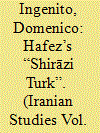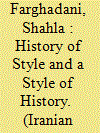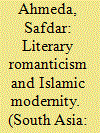| Srl | Item |
| 1 |
ID:
162783


|
|
|
|
|
| Summary/Abstract |
This article constitutes a preliminary attempt to explore the geographical dimension of premodern Persian lyric poetry from the perspective of the relationship between the historical adherence of a text to external reality and the rhetorics of intertextuality and performativity. The pretext for this exploration is the poem known as “Tork-e Shirazi” or “The Turk from Shiraz,” one of the most celebrated ghazals of Hafez of Shiraz. The analysis focuses in particular on the first two lines of the ghazal, whose rich and ambiguous imagery has challenged the community of readers, interpreters, and scholars for centuries. On the basis of historiographical, formalist, and poststructuralist approaches to the study of lyric poetry, the article outlines a generative paradigm that analyzes a given text from the perspective of its abstract, genre-specific, conventionally negotiated, and referential levels of meaning. The contribution of geocritical studies will be combined with rhetorical analysis to conceive of Hafez’s text as a geopoetic map in which the cities of Shiraz, Samarkand, and Bukhara are put in conversation with the mental and historical representations of Iran and India between the thirteenth and fourteenth centuries, during the transition from the Mongol to the Timurid models and ideals of power.
|
|
|
|
|
|
|
|
|
|
|
|
|
|
|
|
| 2 |
ID:
184813


|
|
|
|
|
| Summary/Abstract |
This article considers style in Persian literary history and its critical rhetorical and hermeneutical roles for poets and critics in the medieval and Safavid-Mughal eras. It explores how tarz (manner) emerged as a hermeneutical term in the thirteenth and fourteenth centuries and achieved a central position in sukhansanjī (evaluating speech) in the seventeenth and eighteenth centuries. This account of tarz—grounded in its historicity and multivalent implications—offers new insights into language for early modern Persian literary history, which is often periodized as sabk-i hindī (Indian style) or tāza-gūyī (fresh-speaking). Through a close reading of Safavid-Mughal tazkiras (literary compendiums), this contribution examines tarz as an operating concept deployed by a number of prominent tazkira writers. Finally, the article concludes by discussing this legacy's impact on twentieth-century scholarship.
|
|
|
|
|
|
|
|
|
|
|
|
|
|
|
|
| 3 |
ID:
114018


|
|
|
|
|
| Publication |
2012.
|
| Summary/Abstract |
In the nineteenth century, Muslim modernist reformers sought to ground an agenda for social and political rejuvenation in a return to the spirit of the early Muslim community. However, the influence of this quest for communal regeneration on theological discourses was, in some cases, less notable than its influence upon projects for cultural and social reform. One area of focus for Indian modernists of the nineteenth century was literature and the literary arts, including poetry, which were now deemed relevant to notions of cultural health, authenticity and decline. Under the dictum that a people's condition is reflected in their language, the themes of moral degeneration and reform came to have a strong bearing on the indigenous valuation of poetry and the literary arts, challenging the criteria upon which such literature was judged. In this paper, I will analyse how the modernist agenda for social reform led to the birth of a new literary romanticism in Urdu poetry.
|
|
|
|
|
|
|
|
|
|
|
|
|
|
|
|